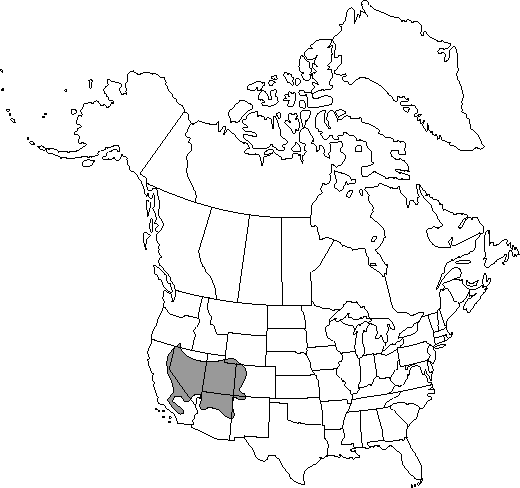Difference between revisions of "Ephedra viridis"
Contr. U.S. Natl. Herb. 4: 220. 1893.
FNA>Volume Importer |
imported>Volume Importer |
||
| (5 intermediate revisions by 2 users not shown) | |||
| Line 8: | Line 8: | ||
}} | }} | ||
|common_names=Green ephedra | |common_names=Green ephedra | ||
| + | |special_status={{Treatment/ID/Special_status | ||
| + | |code=E | ||
| + | |label=Endemic | ||
| + | }} | ||
|basionyms= | |basionyms= | ||
|synonyms={{Treatment/ID/Synonym | |synonyms={{Treatment/ID/Synonym | ||
|name=Ephedra nevadensis var. pluribracteata | |name=Ephedra nevadensis var. pluribracteata | ||
|authority=Palmer ex Stapf | |authority=Palmer ex Stapf | ||
| + | |rank=variety | ||
}} {{Treatment/ID/Synonym | }} {{Treatment/ID/Synonym | ||
|name=Ephedra nevadensis var. viridis | |name=Ephedra nevadensis var. viridis | ||
|authority=(Coville) M. E. Jones | |authority=(Coville) M. E. Jones | ||
| + | |rank=variety | ||
}} | }} | ||
|hierarchy=Ephedraceae;Ephedra;Ephedra viridis | |hierarchy=Ephedraceae;Ephedra;Ephedra viridis | ||
| Line 38: | Line 44: | ||
-->{{#Taxon: | -->{{#Taxon: | ||
name=Ephedra viridis | name=Ephedra viridis | ||
| − | |||
|authority=Coville | |authority=Coville | ||
|rank=species | |rank=species | ||
| Line 52: | Line 57: | ||
|publication title=Contr. U.S. Natl. Herb. | |publication title=Contr. U.S. Natl. Herb. | ||
|publication year=1893 | |publication year=1893 | ||
| − | |special status= | + | |special status=Endemic |
| − | |source xml=https:// | + | |source xml=https://bitbucket.org/aafc-mbb/fna-data-curation/src/2e0870ddd59836b60bcf96646a41e87ea5a5943a/coarse_grained_fna_xml/V2/V2_506.xml |
|genus=Ephedra | |genus=Ephedra | ||
|species=Ephedra viridis | |species=Ephedra viridis | ||
Latest revision as of 20:23, 5 November 2020
Shrubs erect, 0.5–1 m. Bark gray, cracked and irregularly fissured. Branches alternate or whorled, rigid, angle of divergence about 30°. Twigs bright green to yellow-green, becoming yellow with age, not viscid, ridges between longitudinal grooves barely papillate, smooth; internodes 1–5 cm. Terminal buds conic, 1–2 mm, apex obtuse. Leaves opposite, 2–5 mm, connate to 1/2–3/4 their length, not photosynthetic; bases thickened, brown, persistent, becoming hard, enlarged, and black; apex setaceous. Pollen cones 2–several at node, obovoid, 5–7 mm, sessile; bracts opposite, 6–10 pairs, light yellow and slightly reddened, ovate, 2–4 × 2–3 mm, membranous, slightly connate at base; bracteoles slightly exceeding bracts; sporangiophores 2–4 mm, 1/4–1/2 exserted, with 5–8 sessile to nearly sessile microsporangia. Seed cones 2–several at node, obovoid, 6–10 mm, sessile or on short, scaly peduncles; bracts opposite, 4–8 pairs, ovate, 4–7 × 2–4 mm, membranous or papery, with yellow center and base, margins entire. Seeds 2, ellipsoid, 5–8 × 2–4 mm, light brown to brown, smooth. 2n = 28.
Phenology: Coning spring.
Habitat: Dry rocky slopes and canyon walls
Elevation: 800–2500 m
Distribution

Ariz., Calif., Colo., Nev., N.Mex., Oreg., Utah, Wyo.
Discussion
Selected References
None.